Scheduling shifts in the hospitality industry can be difficult to balance. On one hand, you want to provide your clients with a seamless experience, while also organising and scheduling shifts effectively. Restaurants, hotels, and similar customer-centric service jobs make up 7.1% of all UK jobs. In other words, the hospitality industry employs around 3.5 million people. That’s a whole lot of people to manage. That’s why in 2026, more and more businesses are turning to hospitality scheduling software. A solution to help them overcome complications and streamline their staff scheduling process. We’ve outlined the 5 best hospitality scheduling software in 2026 so you can gain back time and take control over your weekly schedules.
What is Hospitality Scheduling Software?
Hospitality scheduling tools are platforms that help employers manage schedules effectively. These scheduling tools allow employees to request shift swaps while centralising the team’s schedules to give managers full visibility into who’s working and who’s not. Additionally, the best scheduling tools offer a range of features, including automated notifications, an employee portal to swap shifts and the capability to sync with time and attendance and payroll.
📌 Download your free shift scheduling template
Why is Hospitality Staff Scheduling Software Important?
Optimising schedules in the hospitality industry can drive service excellence and, consequently, satisfy both customers and staff. In this sense, effective scheduling strategies can boost your team’s overall productivity. By optimising your scheduling strategy, you can control labour costs, adhere to employee availability and prevent the need for overtime. This prevents your team from burning out and eliminates the risk of being understaffed during peak hours.
This practice not only nurtures team well-being, but also fosters a more balanced work-life balance for each member. Therefore, people can nurture their satisfaction, giving them the energy and willingness to serve customers with kindness and empathy.
The impact on customer experience is undeniable. With a fresher, more engaged team, wait times are drastically reduced, giving way to more attentive service and superior quality of service.
The 5 Best Hospitality Scheduling Software 2026
This list includes the top 5 best scheduling software solutions for hospitality businesses. We’ve outlined key features, pros and cons, prices, and even provided you with a comprehensive overview.
Factorial
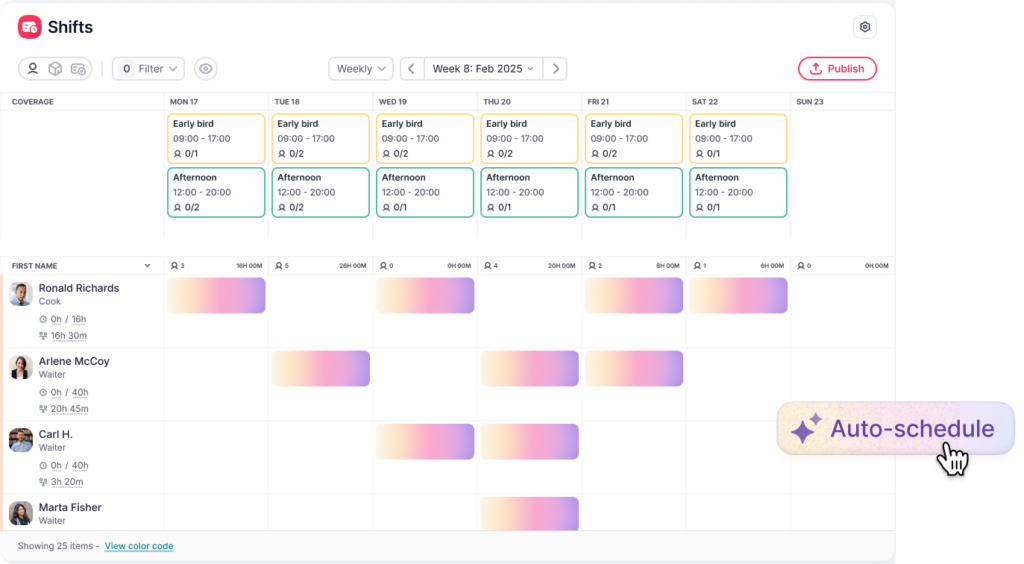
Factorial provides a full suite of tools, from shift scheduling to time and attendance tracking, payroll, performance management, and many more. It’s a business management software designed to streamline your core operations. Its rota software lets you easily drag and drop schedules, utilise templates and it flags any scheduling conflicts. It helps organisations control labour costs by notifying managers if the schedule violates any break regulations, saving them from costly fees.
Additionally, it offers more than scheduling software; you can also track performance, set goals, and submit time off requests. It’s an ideal platform for any hospitality business looking to scale their team and automate their process from one single platform.
📌 Don’t forget to download your free hospitality scheduling template
Key features:
- Automatically create staff schedules with Factorial’s built-in AI.
- Approve/deny swap shift requests in just a few clicks.
- Syncs with time off and employee hours to avoid any conflicts.
Pros:
- Provides a clear overview of your team’s schedule with its easy-to-navigate interface.
- Analyses previous business trends and schedules to adequately forecast coverage needed.
- Instant conflict detection to avoid errors and/or costly fees.
Cons:
- Limited automation capabilities.
- Lacks a robust payroll system.
Price: Plans start at $8 per employee per month.
Rotacloud
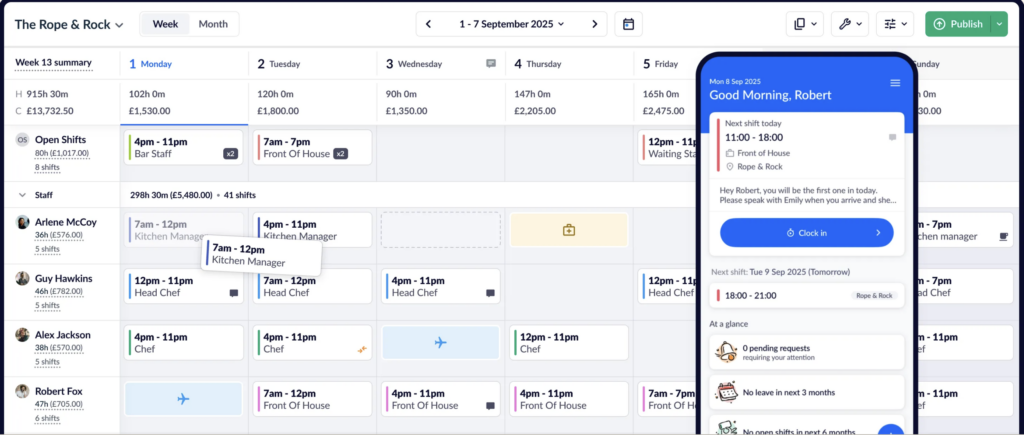
Rotacloud is an online hospitality rota software. It allows teams to simplify their scheduling process while giving them visibility into their costs, timesheets, attendance, and shift hours. Due to the platform’s transparency, managers can manage overtime hours and gain tighter control on their labour costs.
Key features:
- Real-time labour costs as you schedule shifts.
- Clear overview of shifts as well as time off and availability.
- Instant notifications.
Pros:
- Offers a 30-day free trial.
- Comprehensive features for cost control.
- Centralises time off, shifts and shift swapping.
Cons:
- No integrated AI capabilities like Factorial or other platforms.
- Not well suited for large enterprises.
Price: Rotacloud offers its Standard package at £60/month and Pro at £90/month for 21-30 employees. Additional add-ons include time and attendance (£27) and SMS notifications (£12).
Deputy
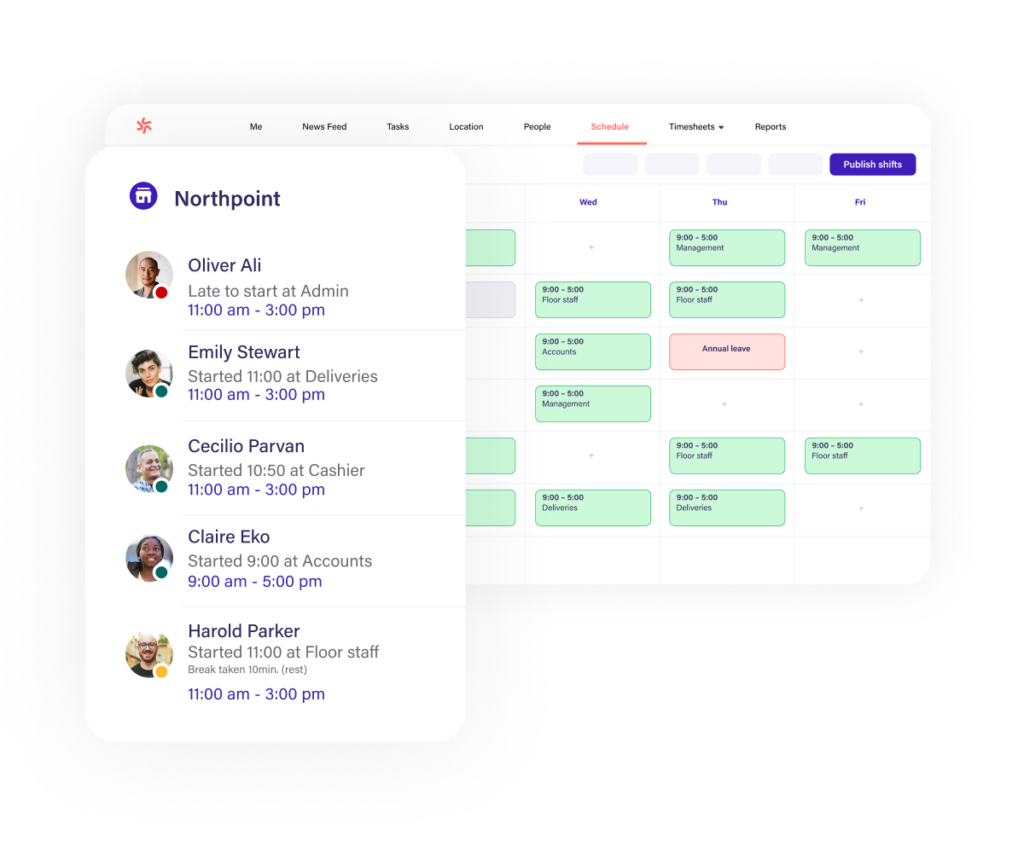
Deputy is a popular shift management tool, particularly for retail stores. Its platform helps organisations stay organised while managing a large staff. It offers filtering capabilities to filter by role, department, or location so managers can centralise relevant information quickly. Additionally, it offers a mobile scheduling app where staff can edit their availability, submit time off requests, and swap shifts.
Key features:
- Drag and drop interface to assign shifts.
- Provides forecasting capabilities to analyse previous trends.
- Streamlines the shift swap process.
Pros:
- Syncs with attendance tracking so you can monitor employee clock-ins and hours.
- High flexibility and can handle schedules for multiple locations.
- Provides automation scheduling features.
Cons:
- Mobile limitations involving GPS drift.
- HR and analytics are not included in their main bundles.
Price: Deputy offers 3 different tiers: Lite ($5 per employee per month), Core ($6.50 PEPM), and Pro ($9 PEPM). Additionally, there are add-on features, including HR and analytics, at an extra fee.
7shifts
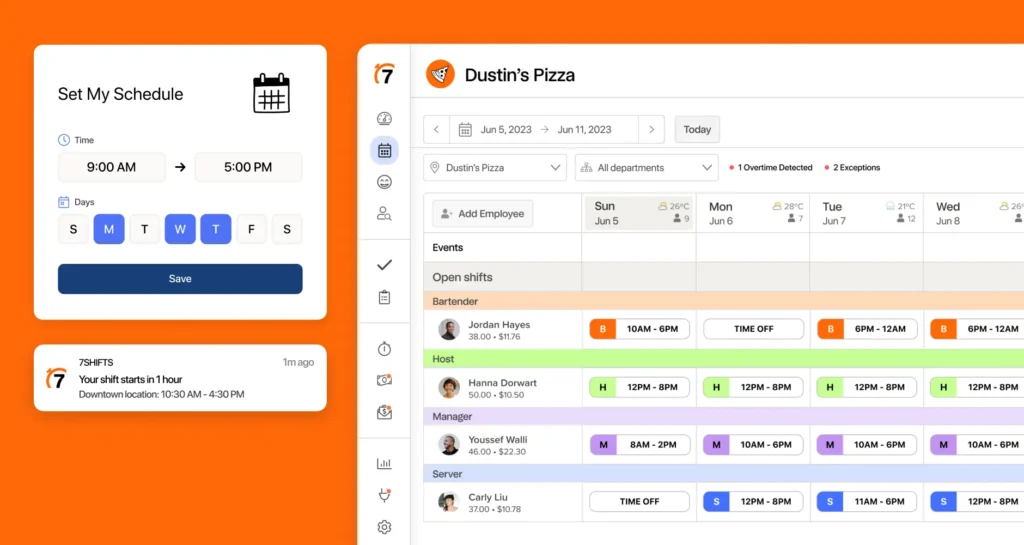
7shifts is a popular restaurant scheduling software in the UK. Its user-friendly interface and advanced features make it a top choice for managers. This platform reduces the manual and repetitive workload that goes into shift creation and frees up managers’ time to focus on optimising labour costs and workforce management.
Key features:
- Offers POS integrations.
- Tracks overtime and meal breaks to ensure compliance.
- Tracks labour costs.
Pros:
- Built for restaurants, quick services, and catering businesses.
- Provides tip management tools and payroll.
- Offers a free version.
Cons:
- Additional features like tip management and employee onboarding are available at extra fees.
- Multi-location usage may require a lengthy onboarding session.
Price: You can pay on a monthly or annual basis with 7shifts. Additionally, they offer different tiers, including a free plan for a single location with up to 15 employees. Their Essentials, Pro and Premium plans vary depending on your payment plan (monthly vs. annually).
Essentials: $44.99/month up to 30 employees or $39.99/month/location (annual billing) up to 30 employees
Pro: $89.99/month/location for unlimited employees or $79.99/month/location (annual billing) for unlimited employees
Premium: $149.99/month/location for unlimited employees or $139.99/month/location (annual billing) for unlimited employees
When I Work
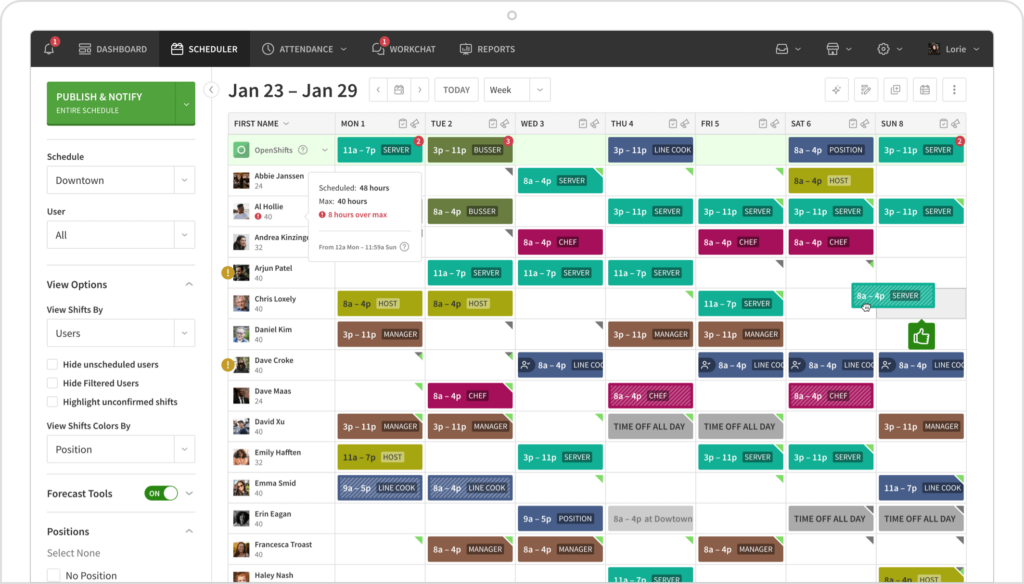
When I Work is a user-friendly restaurant scheduling software. It simplifies staff scheduling by offering automated scheduling features and the ability for employees to request to swap shifts and time off. It streamlines employee management by centralising time tracking for employee hours and employee availability. Utilising When I Work helps managers effectively manage their workforce and control labour costs.
Key features:
- Provides shift templates and auto-assign options.
- Centralises time off, employee availability and shift swap features.
- Integrates with payroll for seamless payments.
Pros:
- Easy to use, onboard and implement in your team.
- Instant notifications for overtime or absent shifts.
- Ideal for retail, restaurants, and healthcare industries.
Cons:
- Doesn’t offer additional workforce management tools like onboarding or payroll.
- Lacks advanced features for enterprises.
Price: For a single location, pricing starts at $2.50 per user per month. For multi-locations, pricing starts at $5 per user per month.
Key Features of Hospitality Scheduling Software
Taking control of your workforce management and hospitality scheduling strategies is essential for seamless operations. The best way to support your team is with hospitality staff scheduling software. Here are the key features to look for in software for hospitality.
- Automated scheduling: Let AI work for you by creating schedules and all you have to do is review them.
- Real-time notifications: If there is a scheduling conflict get an instant alert.
- Shift swapping: Employees can request to swap shifts, and managers can approve.
- Time and attendance: Sync your scheduling with your team’s hours and time off requests.
- Scheduling app: Full access right at your fingertips, wherever you are.
Benefits of Hospitality Scheduling Software
Reduced admin tasks
By automating scheduling, managers can spend less time on admin and more time on employee management, boosting overall operational efficiency. With fewer manual tasks, teams can focus on making a strategic impact, understanding the organisation’s needs, ensuring adequate shift coverage, and preventing employee overload.
Compliance with labour laws and regulations
A hospitality scheduling app helps managers comply with labour regulations by notifying them of any scheduling conflicts, including break violations and overscheduling/unscheduling team members. This saves organisations from paying costly penalties and helps control labour costs. Overall, hospitality rota software assists managers when creating schedules by taking into account availability, labour laws and peak hours.
Enhanced internal communication
Utilising a hospitality staff scheduling tool ensures that there is a clear and effective process to inform your team members about their schedule, shift changes, and any other relevant information. Additionally, it provides an overview for both managers and employees to view upcoming shifts and express any concerns about their schedules. This can help avoid misunderstandings, scheduling conflicts and provide full alignment within the team.
Fair rotation of shifts
Creating an equally distributed schedule means rotating which team members work during high-demand shifts, such as the weekends or peak hours. This best practice helps prevent team fatigue and burnout. With hospitality scheduling software, you’ll be able to analyse previous schedules and adjust accordingly to optimise staffing levels and employee satisfaction.
How Factorial can Help you
Organising employee schedules is complex enough. Not to mention, working around your team’s availability, time off requests and last-minute changes. However, with the right software, you can centralise all relevant information and be prepared for when things don’t go as planned.
Making adjustments and approving shift swaps will be simplified with Factorial. This platform allows teams to enhance their team communication with their mobile app, centralised document storage and full-visibility into their team’s schedule. Factorial’s hospitality rote software automates the creation of scheduling, provides a drag and drop feature, analyses previous trends for optimised coverage and helps gain control of labour costs. Furthermore, its scheduling system syncs with payroll, employee hours, time off, project management, and performance reviews. That way, you can manage all your core business operations from one single platform.
The information presented on this page is based on publicly available sources and not limited to deputy.com, rotacloud.com, 7shifts.com, wheniwork.com, Capterra public reviews, G2 public reviews, and trustpilot public reviews. The comparisons between Factorial and other providers, are intended solely for the illustration of the respective software features, pricing and functionalities. All information regarding features, prices, and integrations may be subject to change without prior notice. Factorial assumes no liability for the accuracy, completeness, or timeliness of the information presented. We recommend contacting the respective providers directly to obtain the most accurate and up-to-date information. All legal regulations regarding spanish fair advertising and competition law are fully observed by us; if you have any concerns, please reach out to us. The comparisons presented do not constitute a final evaluation or recommendation for any provider, but serve solely as an informational source.



